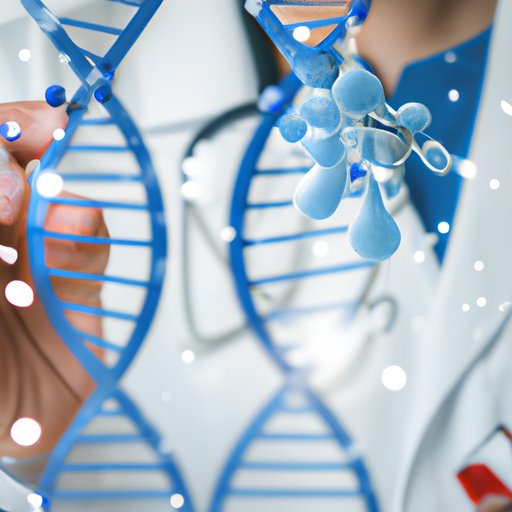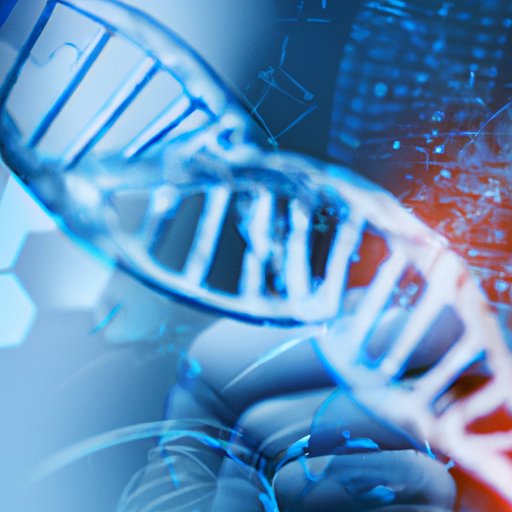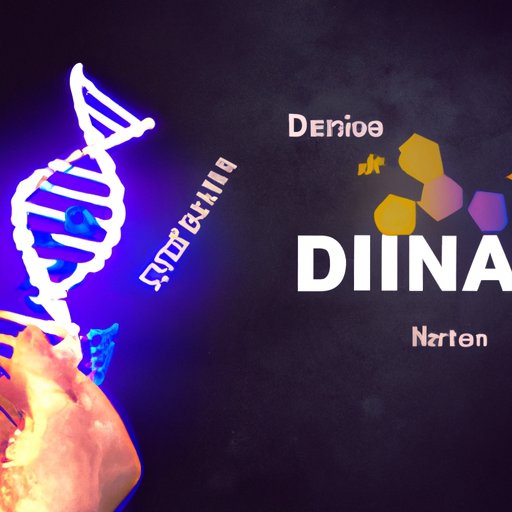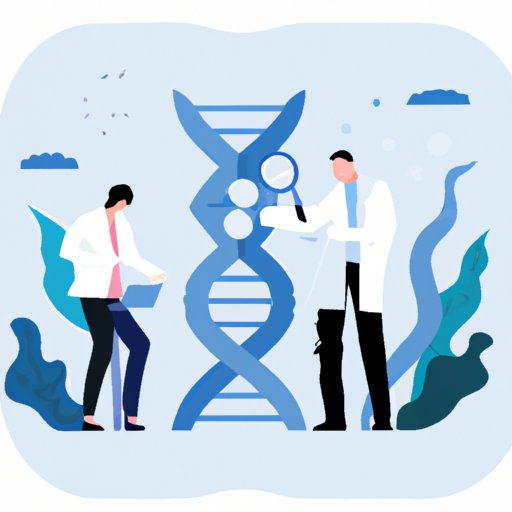Introduction
DNA technology is a rapidly growing field that has revolutionized the way we understand and treat diseases. As the science behind this technology continues to advance, it is increasingly being used in many areas of medicine, including diagnosis, treatment, personalized medicine, and medical research. This article will explore how DNA technology is being used in each of these areas and examine the potential benefits and challenges of using this technology in medicine.

Exploring the Use of DNA Technology in Diagnosing and Treating Diseases
DNA technology is being used in a variety of ways to diagnose and treat diseases. The most common use of this technology is for genetic testing, which can be used to identify genetic mutations or abnormalities that are associated with certain diseases. For example, genetic testing can be used to detect mutations in the BRCA1 and BRCA2 genes, which are associated with an increased risk of breast and ovarian cancer. Additionally, genetic testing can be used to identify conditions such as cystic fibrosis and Huntington’s disease, which are caused by specific gene mutations.
Beyond genetic testing, DNA technology is also being used to develop targeted treatments for various diseases. For example, researchers have identified specific gene mutations that are associated with certain types of cancer, and they are now using this information to develop targeted drugs that can target these mutations and stop the growth of cancer cells. Additionally, DNA technology is being used to create personalized vaccines, which are tailored to an individual’s specific genetic makeup.
Harnessing DNA Technology to Personalize Medicine
Personalized medicine is a rapidly growing field of medicine that uses an individual’s genetic profile to determine the best course of treatment for them. By understanding an individual’s unique genetic makeup, physicians and scientists can tailor treatments to target specific gene mutations and provide more effective care. With the help of DNA technology, personalized medicine is becoming increasingly accessible and affordable, allowing more people to benefit from its potential.
For example, researchers at the University of Oxford developed a personalized vaccine for melanoma, a form of skin cancer, which was tailored to an individual’s specific tumor mutations. The vaccine was able to target the mutations in the patient’s tumor, leading to an improved response to treatment and a longer survival rate. This demonstrates how DNA technology can be used to create personalized treatments that are tailored to an individual’s specific needs.
Examining the Potential of DNA Technology for Developing New Therapies
DNA technology is also being used to develop new therapies for a variety of conditions. One of the most promising techniques is gene therapy, which involves introducing a healthy version of a gene into a person’s body to replace a faulty one. For example, researchers have developed a gene therapy for cystic fibrosis, which involves introducing a healthy copy of the CFTR gene into a person’s cells. This therapy has been shown to improve lung function in patients with the condition.
Additionally, DNA technology is being used to develop therapies that involve using modified viruses to deliver therapeutic genes to specific tissues in the body. For example, researchers at the University of Pennsylvania developed a virus-based gene therapy for hemophilia A, which involves delivering a gene that produces a clotting factor to the liver. This therapy has been shown to reduce bleeding episodes in patients with the condition.

Analyzing the Impact of DNA Technology on Medical Research
DNA technology has had a profound impact on medical research, allowing researchers to explore the genetic basis of disease and discover new treatments. For example, sequencing the human genome has provided researchers with a wealth of data about the genetic mutations that are associated with various diseases. This information has enabled researchers to develop targeted treatments for a variety of conditions, such as cancer and rare genetic disorders.
Additionally, DNA technology has allowed researchers to study the effects of environmental factors on health. For example, researchers have used DNA technology to study the effects of air pollution on cardiovascular disease. This type of research has enabled us to better understand the role of environmental factors in health and disease, and provides us with valuable insight into how we can reduce the risk of developing certain diseases.
Investigating How DNA Technology is Transforming Medical Practices
DNA technology is also changing the way medical practices operate. For example, genetic testing is becoming increasingly common in clinical settings, allowing physicians to quickly and accurately diagnose various conditions. Additionally, DNA technology is being used to develop personalized treatments and therapies, which are tailored to an individual’s specific genetic makeup. This type of personalized medicine allows physicians to provide more effective care to their patients.
However, the use of DNA technology in medical practices also poses some challenges. For example, there is a lack of standardization for genetic tests, which can lead to inaccurate results. Additionally, the cost of genetic testing can be prohibitive for many people, making it difficult for them to access the care they need.

Understanding the Benefits and Challenges of Using DNA Technology in Medicine
The use of DNA technology in medicine has the potential to revolutionize the way we diagnose and treat diseases. From providing accurate diagnoses to creating personalized treatments, DNA technology has the potential to dramatically improve healthcare. Additionally, the use of this technology in medical research can provide us with valuable insight into the genetic basis of disease and how we can prevent and treat it.
However, there are also some challenges associated with using DNA technology in medicine. For example, the cost of genetic testing can be prohibitive for many people, and there is a lack of standardization for these tests, which can lead to inaccurate results. Additionally, as with any new technology, there is a risk of overdiagnosis and overtreatment, which can lead to unnecessary procedures and treatments.
Conclusion
DNA technology is a rapidly growing field that has the potential to revolutionize the way we diagnose and treat diseases. From providing accurate diagnoses to creating personalized treatments, DNA technology has the potential to dramatically improve healthcare. However, there are also some challenges associated with using this technology, such as the cost of genetic testing and the risk of overdiagnosis and overtreatment. Going forward, it is important to continue to explore the potential of DNA technology in medicine and consider the benefits and challenges associated with its use.
(Note: Is this article not meeting your expectations? Do you have knowledge or insights to share? Unlock new opportunities and expand your reach by joining our authors team. Click Registration to join us and share your expertise with our readers.)
